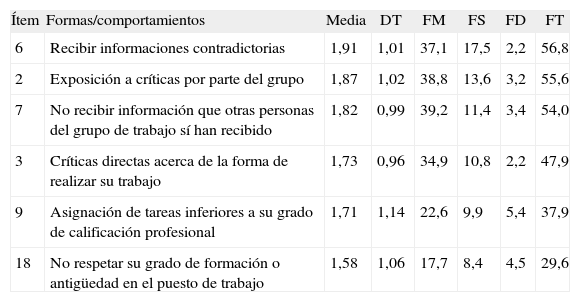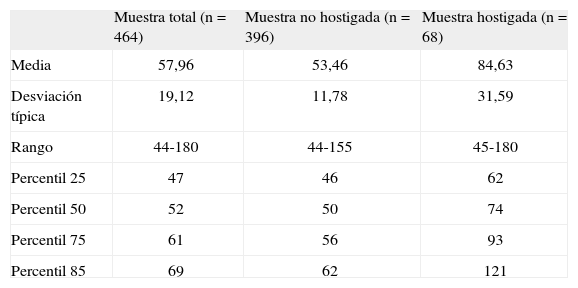Determinar tipo, frecuencia y procedencia de conductas hostiles habituales en una muestra de enfermeras de Baleares y las variables socioprofesionales implicadas.
MétodoEstudio transversal y descriptivo. Muestra constituida por 464 enfermeras y enfermeros colegiadas en la Comunidad Autónoma de les Illes Balears: 392 mujeres y 49 varones. Edad situada entre 25 y 65 años (media: 35,11 y desviación típica = 9,62). Trabajaban en instituciones públicas 368 y en privadas 71. Instrumento utilizado: Cuestionario de Hostigamiento Psicológico-HPT.
ResultadosEl 17,2% de las enfermeras encuestadas se percibe hostigada psicológicamente en el trabajo (varones: 22,4%; mujeres: 14,5%). Aparecen diferencias muy significativas según la edad, pero no según la institución. Los comportamientos hostiles más frecuentes se refieren a distorsiones en la información, críticas hacia la supuesta víctima y falta de consideración profesional. Estas conductas proceden mayoritariamente y de forma muy significativa de los jefes.
ConclusionesLos resultados muestran que 1 de cada 5 enfermeras de Baleares se percibe hostigada. Sin embargo, la baja tasa de respuesta obliga a ser cautos en la generalización. Aun así, consideramos que son datos que hay que tener en cuenta por parte de las instituciones sanitarias para que los órganos de prevención aseguren un comportamiento que proteja la salud y dignidad de los trabajadores.
To determine the type, frequency and cause of the most frequent hostile behaviors in a sample of nurses in the Balearic Islands and the socio-professional variables involved.
MethodWe performed a cross-sectional descriptive study. The sample was composed of 464 members of the association of nurses of the Balearic Islands (392 women and 49 men). Age ranged from 25 to 65 years (mean: 35.11; SD: 9.62); 368 worked in public institutions and 71 in private centers. The instrument used was the Psychological Mobbing Questionnaire.
ResultsA total of 17.2% of the nurses believed they had experienced mobbing at work (men: 22.4%; women: 14.5%). Significant differences were found according to age, but not according to institution. The most frequent hostile behavior was related to distortion of information, criticism of the purported victim, and lack of professional consideration. The perpetrators of mobbing were mainly, and very significantly, the bosses.
ConclusionsAccording to these results, one in five nurses in the Balearic Islands has experienced mobbing in the workplace. However, because of the low response rate, caution should be exercised when generalizing these results. Nevertheless, health institutions should bear these findings in mind to ensure standards of behavior that do not jeopardize workers' health and dignity.










